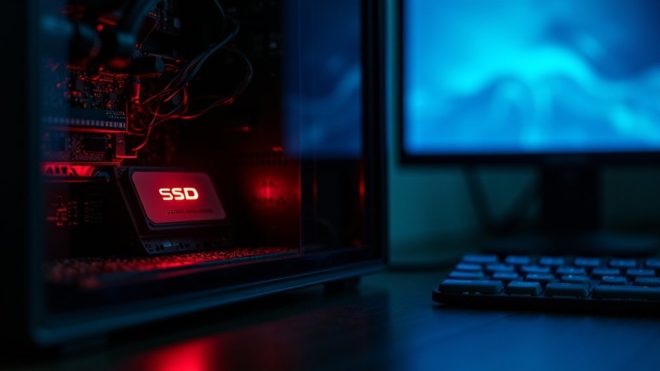Microsoft’s Windows 11 update KB5063878 is causing serious SSD failures and data corruption across multiple manufacturers, particularly affecting drives above 60% capacity. Users report complete drive disappearances, file system corruption, and critical data loss on high-end SSDs from Corsair, SanDisk, and Kioxia. As Microsoft describes it as a “rare race condition,” mounting evidence suggests a systemic issue between the update and SSD controller firmware. The unfolding situation raises urgent questions about mandatory update safety.

Why are Windows 11 users suddenly concerned about their SSDs? Microsoft‘s mandatory security update KB5063878, released on 12 August 2025, has sparked widespread alarm as users report their solid-state drives mysteriously corrupting or vanishing entirely under specific conditions.
The update, which can’t be easily uninstalled without first disabling Windows Sandbox, appears to trigger devastating storage issues when SSDs reach 60% capacity and face substantial data writes exceeding 50GB. Users have witnessed their drives turning RAW, experiencing file system corruption, and in nightmare scenarios, disappearing completely from BIOS – leaving valuable data potentially irrecoverable. Critical professional projects and databases were among the most affected data.
SSDs mysteriously vanish or corrupt when hitting 60% capacity under KB5063878, creating a terrifying wave of data loss across Windows 11 systems.
The storage apocalypse isn’t playing favourites. High-end drives from Corsair, SanDisk, and Kioxia have all fallen victim, with InnoGrit and Phison controllers taking centre stage in this digital drama. Phison has stepped into the spotlight, acknowledging their involvement and partnering with Microsoft to crack the case of the vanishing volumes.
Think your drive’s immune? Think again. The issue manifests like a perfect storm – combining nearly full drives, intense write operations, and possibly thermal throttling into a data-destroying tempest. Some users have reported their secondary drives becoming corrupted faster than you can say “backup,” particularly when handling resource-intensive tasks like updating massive game installations or managing large project databases. The problem has also caused OBS-based solutions to malfunction after installing the update.
Microsoft’s response has raised eyebrows across the tech community. In spite of mounting evidence and user reports, the company maintains there’s no direct link between KB5063878 and the SSD failures. They’ve labelled it a “rare race condition” – tech speak for “it’s complicated” – rather than admitting to a systemic flaw in the update.
The plot thickens with technical theories suggesting a complex interplay between SSD cache management, Windows I/O scheduling, and controller firmware behaviour. A leaked document listing affected controllers added fuel to the fire, though Phison quickly distanced itself from the revelation.
For now, Windows 11 users are caught between a rock and a hard drive. The mandatory update can’t be easily avoided, yet the risk of data loss looms large for those with affected hardware. As Microsoft and controller manufacturers continue their investigation, users are left wondering: is their SSD next in line for the digital chopping block?
The situation serves as a stark reminder that even in 2025, the intersection of software updates and hardware compatibility remains a delicate performance. As the tech community awaits a definitive solution, the KB5063878 saga highlights the critical importance of regular backups and the potential risks of mandatory updates in our increasingly digital world.
Final Thoughts
The recent KB5063878 update has underscored the risks associated with routine Windows updates, particularly concerning SSD data corruption. As Microsoft works to resolve these issues, it’s essential for users to prioritize data backups and approach system updates with caution. Ipswich Computer Repairs is here to assist you in navigating these challenges and ensuring your data remains safe. Don’t wait for a potential crisis—click on our contact us page to get in touch and secure your system today!

